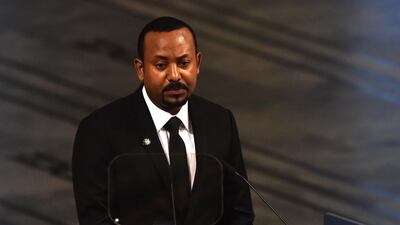Ethiopian Prime Minister Abiy Ahmed has been awarded the 100th Nobel Peace Prize for forging an end to almost two decades of conflict with neighbouring Eritrea.
In his acceptance speech, Mr Abiy described how his personal exposure to the horrors of conflict drove him to seek a rapprochement.
On Tuesday, at the ceremony in Oslo, he denounced the "evangelists of hate" stoking ethnic violence in his country.
"The evangelists of hate and division are wreaking havoc in our society using social media," he said.
"Together we must neutralise the toxin of hatred."
He has warned that social media hate posts are undermining Ethiopia’s delicate political transition.
Since he came to power in April 2018, his reforms aimed at opening up the country have paradoxically given rise to ethnic tensions.
“War is the epitome of hell for all involved,” said Mr Abiy, who served as a radio operator in the Ethiopian army and was the only survivor of an artillery attack on his unit during the war.
“I know because I have been there and back.”
Mr Abiy, 43, became Africa’s youngest leader when he was appointed prime minister in March 2018, and immediately announced a swathe of political and economic reforms.
Three months later, he and Eritrean President Isaias Afwerki agreed a peace accord to end a stalemate that followed a 1998-2000 border war in which as many as 100,000 people died.
Mr Abiy described him as his partner and said his goodwill and commitment played a vital role in bringing about the deal that persuaded the United Nations to lift decade-old sanctions on Eritrea.
“We understood our nations are not enemies,” the Ethiopian leader said in a prepared speech.
“Instead, we were victims of the common enemy called poverty. We recognized that while our two nations were stuck on old grievances, the world was shifting rapidly and leaving us behind.”
He described the two nations’ commitment to peace as “iron-clad”.
Mr Abiy's visit to Norway was also marked by his decision not to attend a press conference - traditionally an integral part of the Nobel Peace Prize award program.
In unusual criticism of a laureate, the head of the Norwegian Nobel Committee said last week the snub was “very unfortunate”.
The Nobel Committee went as far as sending its secretary to Addis Ababa to try to convince him to talk to the press during his visit, but to no avail, said Chairwoman Berit Reiss-Andersen.
Former US President Barack Obama also skipped the press conference when he claimed the prize in 2009, taking only two questions from selected media.
Mr Abiy was born in the small town of Beshasha in Ethiopia’s Oromia state and holds masters degrees in business administration and transformational leadership and a PhD in traditional conflict resolution.
He served as a lieutenant-colonel in the Ethiopian National Defence Force, an acting director of the country’s cyber-security intelligence agency and science and technology minister.
Ms Reiss-Andersen said he has seized the initiative during the transition in power in Ethiopia to swiftly address the deadlock in the standoff with Eritrea, and was the main architect behind the peace deal.
“You have chosen a path that we believe will consolidate peace and prosperity in your country,” she said.
“You represent a new generation of African leaders who realize that armed conflict and ethnic hostilities must be resolved by peaceful means.”
Past laureates include former South African President Nelson Mandela and US civil rights leader Martin Luther King Jr.


